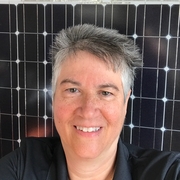- Level Foundation
- المدة 9 ساعات hours
- الطبع بواسطة University at Buffalo
-
Offered by

عن
By the end of this course, learners will have acquired a broad understanding of the history and mechanics behind converting light into electricity, commonly known as photovoltaics (PV). They are empowered to recognize and describe elements of a PV system, enabling them to: compare the most common types of solar cells, sketch a solar PV system, and analyze differences between rooftop and ground mounting configurations. The course explores economic considerations, touching on solar PV costs for residential and commercial use, incentives, and contrasts solar power with fossil fuel and nuclear plants. This course is ideal for anyone interested in entering the solar power sector, whether fresh to the workforce or switching industries. The curriculum is especially useful for engineers, HVAC installers, architects, and building code inspectors. Material includes online lectures, videos, demos, project work, readings and discussions. This is the first course in the Solar PV for Engineers, Architects and Code Inspectors specialization. To learn more about the specialization, check out a video overview at https://youtu.be/XjkKzbXqA6s.الوحدات
Acknowledgements
1
Readings
- Acknowledgements
Solar Industry History
1
Videos
- Solar Industry History
1
Readings
- Solar History Timeline
The Value of Solar Energy
1
Videos
- The Value of Solar Energy
2
Readings
- Solar and Wind Energy Maps (Optional)
- Climate Change (Optional)
Solar Cells
1
Videos
- Solar Cells- Origins and Proliferation
1
Readings
- How Solar Cells Work (Optional)
Clean Energy Incentives
1
Discussions
- Clean Energy Incentives
1
Videos
- Clean Energy Incentives
1
Readings
- Solar Incentives, Rebates, and Tax Credits (Optional)
Solar Power Self-Check
1
Assignment
- Solar Power Self-Check
Solar Power Graded Quiz
1
Assignment
- Solar Power Graded Quiz
How PV Works
1
Videos
- How PV Works
1
Readings
- The Photovoltaic Effect (Optional)
Solar Electric System Anatomy
3
Videos
- Solar Electric System Anatomy
- Hands-on Demo: Solar Panel (Front)
- Hands-on Demo: Solar Panel (Back)
2
Readings
- Grid-tied vs Off-grid PV systems (Optional)
- Solar Panel Specifications (Optional)
PV System Components
4
Videos
- PV System Components
- Hands-on Demo: Microinverters
- Hands-on Demo: String Inverters
- Hands-on Demo: Inverter Attachments
2
Readings
- Semi-Conductors: Temperature and Resistivity (Recommended)
- PV System Components (optional)
Rooftop Systems
4
Videos
- Rooftop Systems
- Hands-on Demo: Rooftop Attachments- Flashing
- Hands-on Demo: Rooftop Attachments- Rails
- Hands-on Demo: Rooftop Attachments- Standing Seams
Alternatives to Rooftop Systems
1
Discussions
- Rooftop vs Ground/Pole Mounted PV Systems
1
Videos
- Alternatives to Rooftop Systems
The Nature of PV Self-Check
1
Assignment
- The Nature of PV Self-Check
The Nature of PV Graded Quiz
1
Assignment
- The Nature of PV Graded Quiz
Economics of Solar Power
1
Discussions
- Economics of Solar Power
1
Videos
- Economics of Solar Power
1
Readings
- Economics of Solar Power (Optional)
Solar PV System Costs
1
Videos
- Solar PV System Costs
2
Readings
- Calculating System Cost
- State Incentives for Renewables (Optional)
Calculating ROI
1
Videos
- Calculating ROI
2
Readings
- Example ROI Calculation
- Calculating ROI (Optional)
Solar Plant Advantages
1
Videos
- Solar Plant Advantages
1
Readings
- Utility-Scale Solar (Optional)
Solar Power ROI Self-check
1
Assignment
- Solar Power ROI Self-Check
Solar Power ROI Graded Quiz
1
Assignment
- Solar Power ROI Graded Quiz
Final PV System Analysis Project
1
Assignment
- PV System Analysis Project
1
Peer Review
- Analysis Project (Optional, but Recommended)
Auto Summary
This comprehensive course on Solar Energy Systems, offered by Coursera, delves into the history and mechanics of photovoltaics (PV), enabling learners to understand and describe PV system components. Ideal for engineers, HVAC installers, architects, and building code inspectors, the course covers solar cell types, system configurations, and economic considerations. Featuring online lectures, videos, demos, and project work, this foundational course spans 540 minutes and is the first in a specialized series. Perfect for those entering the solar power sector or switching industries.

Gay E Canough


